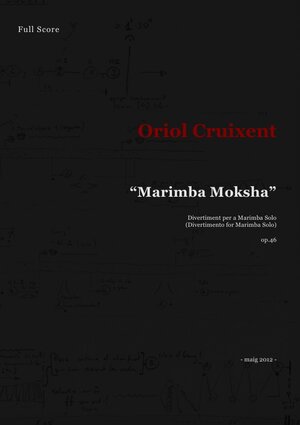
×
![Buchcover ISBN 9783737535434]()
Marimba Moksha (Full Score), Divertimento for Marimba Solo, op.46
Divertimento for Marimba Solo, op.46
von Oriol CruixentTotal duration: ca. 6' -
für 4 Mallets -
Schwierigkeitsgrad: hoch -
(ENG) - In Indian philosophy, the sanskrit word moksha means emancipation, liberation or release. Moksha connotes self-realization and self-knowledge. In Hindu traditions, moksha is a central concept and included as one of the four aspects and goals of human life. The magical character of the middle section of „Marimba Moksha“ is built upon the musical atmosphere of African indigenous tribal peoples. This middle section is surrounded by musical material inspired by the counterpointistic and melodic folklore of the Balkans, using at the same time rhythms inspired by the Brazilian dance „Baião“. Through the conscious loosening of body and mind, the player will experience a very special „Moksha“ while performing the piece. Here, the process of practice may well be involved. This piece was written for the German/Bulgarian percussionist Vivi Vassileva and dedicated to her. -- (DEU) - Das Wort „Moksha“ stammt aus dem Sanskrit und bedeutet wörtlich Erlösung oder Befreiung, wobei sich neben dieser ursprünglichen Bedeutung auch oft Assoziationen mit dem Begriff der Erleuchtung finden. Im Hinduismus bildet das Moksha das letzte der vier Lebensziele, das, nach einigen Traditionen, nur während des menschlichen Lebens erreicht werden kann. Der ruhig-magische Charakter des Mittelteils von „Marimba Moksha“ knüpft an die klanglichen Stimmungen afrikanischer Urvölker an und wird stets von rhythmischen Akzenten, dem Kontrapunkt und orientalischen Melodieflosken aus dem Balkan eingerahmt. Als führendes Element erklingt ein immer gegenwärtiger Rhythmus, der ursprünglich aus dem brasilianischen Tanz “Baião” stammt. Durch die bewusste Auflockerung von Körper und Geist soll der Spieler einen sehr speziellen „Moksha“ erleben. Dabei kann der Prozess des Übens durchaus mit einbezogen werden. Dieses Stück wurde für die deutsch/bulgarische Perkussionistin Vivi Vassileva geschrieben und ihr gewidmet.
(ENG) - In Indian philosophy, the sanskrit word moksha means emancipation, liberation or release. Moksha connotes self-realization and self-knowledge. In Hindu traditions, moksha is a central concept and included as one of the four aspects and goals of human life. The magical character of the middle section of „Marimba Moksha“ is built upon the musical atmosphere of African indigenous tribal peoples. This middle section is surrounded by musical material inspired by the counterpointistic and melodic folklore of the Balkans, using at the same time rhythms inspired by the Brazilian dance „Baião“. Through the conscious loosening of body and mind, the player will experience a very special „Moksha“ while performing the piece. Here, the process of practice may well be involved. This piece was written for the German/Bulgarian percussionist Vivi Vassileva and dedicated to her. -- (DEU) - Das Wort „Moksha“ stammt aus dem Sanskrit und bedeutet wörtlich Erlösung oder Befreiung, wobei sich neben dieser ursprünglichen Bedeutung auch oft Assoziationen mit dem Begriff der Erleuchtung finden. Im Hinduismus bildet das Moksha das letzte der vier Lebensziele, das, nach einigen Traditionen, nur während des menschlichen Lebens erreicht werden kann. Der ruhig-magische Charakter des Mittelteils von „Marimba Moksha“ knüpft an die klanglichen Stimmungen afrikanischer Urvölker an und wird stets von rhythmischen Akzenten, dem Kontrapunkt und orientalischen Melodieflosken aus dem Balkan eingerahmt. Als führendes Element erklingt ein immer gegenwärtiger Rhythmus, der ursprünglich aus dem brasilianischen Tanz “Baião” stammt. Durch die bewusste Auflockerung von Körper und Geist soll der Spieler einen sehr speziellen „Moksha“ erleben. Dabei kann der Prozess des Übens durchaus mit einbezogen werden. Dieses Stück wurde für die deutsch/bulgarische Perkussionistin Vivi Vassileva geschrieben und ihr gewidmet.


